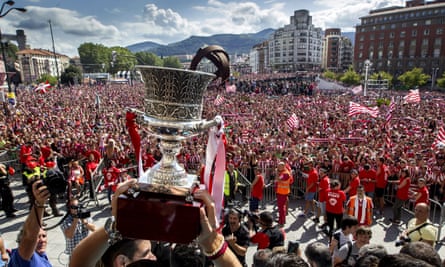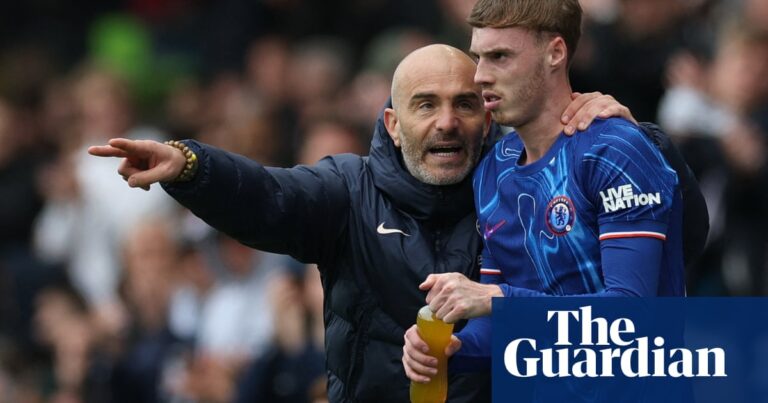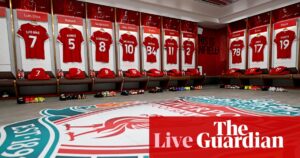Dani Vivian is reading 1984. “Maybe it’s a sign,” the Athletic defender says. He hadn’t thought of it like that, but now that he does there’s a smile. 1984 was the last time his club won a major trophy. Back then, over a million people lined Bilbao, packed on to the banks of the Nervión as the players passed in a barge. Thousands more followed in small boats, anything they could find: dinghies, tugs, canoes. The photos are astonishing and they are everywhere in the city. They are also 40 years old; just the word gabarra (barge) has something mythical about it, instantly understood and loaded with nostalgia.
Longing too. Like the immense majority of his teammates, Vivian grew up supporting Athletic and has heard about the gabarra many times but, born in 1999, he has not won and been on board or seen anyone else there either. Even the club’s sporting director has never witnessed them lifting a trophy. The barge has not sailed in four decades but permits have been requested to unmoor it, just in case. On Saturday Athletic play Real Mallorca in the Copa del Rey final in Seville, 900km south, where 100,000 Basques are expected. This could be the biggest moment in a generation, like something from another time.
“Athletic is unique,” Vivian says, and it needs saying sometimes, a reminder that what they do is not normal. The centre-back, one of four Athletic players in Spain’s last squad, talks about facing Chivas in a friendly. Fielding only Mexicans, in a global game Chivas is an outlier; in post-Bosman Europe, what Athletic do, playing only with those born or raised in the Basque Country, is something else again. “We do it with a region,” Vivian adds. One that accounts for 4.9% of Spain’s population.
It is a miracle. “I think it’s the work,” Vivian responds. “It is the work of lots of people whose names don’t appear but who are there every day.” It is also a reason to recalibrate success, the defender insists – and in fact, there is something in his analysis that could be applied well beyond Bilbao and beyond trophies too.
“‘Forty years’: sometimes, saying that, it’s as if there hasn’t been any history in the meantime, as if in all these years nothing has been written, and that’s not the case,” he says. “You can’t compare eras either. Generations have been here who have worked very well, lots of people have done good things. It’s not that our fans think: ‘bloody hell, they haven’t made us happy in 40 years.’ No. I don’t think it’s like that.”
Far from it. One of only three clubs to have played their entire history in the first division, that Athletic compete at all is a success, an act of defiance, affirmation. They reached this year’s final defeating Atlético Madrid and Barcelona and this is the fifth year running they reached the semi-final. They have played two of the last four finals, five in 15 years, and a Uefa Cup final too. And although there is a warning in the fact that they didn’t win any, there was celebration, achievement and enjoyment. They did win the Super Cup, twice.

Besides, there is something beyond the pitch, a connection that makes them different – and helps them compete. A community, an identity arguably deeper than any club on earth. Every child that is born in the province of Vizcaya receives a bib welcoming them to the family; Vivian appears on posters for their own literacy crusade, part of an entire, inclusive cultural programme. He read Kafka’s The Metamorphosis, not that he liked it that much. “It’s not just the recent history, not just sport, but the way the club treats its people, how it reaches them,” he says. “It’s a very special way of being, very few clubs can create that. It’s like you don’t choose to be an Athletic fan; you’re born with it.”
“It’s very deeply rooted, there in the way we work with our academy, in our ideology,” he continues. “There’s an identification we all share in the dressing room, a group with the same values and experiences: that definitely helps us compete. We have a good time together, but that should never be seen as a lack of discipline. No one is an obstacle. Basque clubs have that character. You see that spirit in Basque football, even in the kids. It’s always there.”
after newsletter promotion
Ilusion is the word: hope, excitement, a dream, the feeling something is happening, something good. “There have been seasons, including the last few, when Athletic have been one step away from winning a trophy,” Vivian says. “We created and built that ilusion, our fans have enjoyed it. That matters. We can’t tell ourselves we haven’t done anything for years, or feel that as a pressure.”
It is inevitable, the weight of the past and the expectation of the present. In none of the six finals over the last 15 years were Athletic favourites but this time they are, not that you will catch them saying so. Mallorca are to be respected even if they are not Barcelona, Atlético or Real Sociedad, their opponents then. But Ernesto Valverde’s team are flying, playing what Ander Herrera calls “rock and roll football, exhausting for opponents”: relentless and fun to watch too. They blew Atlético and Barcelona away, scoring seven times across the quarters and semis at San Mamés. At the end of each game, Vivian admits, he is exhausted, as much mentally as physically. But it is the way he likes it; it is also worth it.
“In previous years we did good things but maybe didn’t take that final step. Now we are where we are and we don’t want to come down from there,” he says. “I see a spark, a togetherness. There’s an energy and strength that is contagious.” Athletic are fighting for a Champions League place and have a place in the final. A place in history awaits, so too the barge. It is not that they have done nothing, no, but this would be everything. Growing up here hearing the stories from another time they never saw for themselves, Vivian and his team mates know that. A moment so big, a story so deep someone should write a book about it.
Source: theguardian.com


















